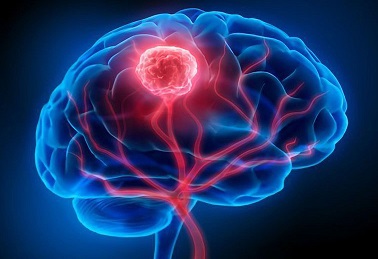SARS-CoV-2 And Cancer: Increased neuropilin-1 Expression As A Result Of COVID-19 Can Lead To Progression Of Primary Brain Tumors Besides Neurological Issues!
SARS-CoV-2 - Cancer Feb 28, 2023 2 years, 1 month, 2 weeks, 5 days, 21 hours, 7 minutes ago
SARS-CoV-2 And Cancer: Researchers are warning that as a result of increased neuropilin-1 (NRP1) expression due to COVID-19 infections, besides various neurological issues arising…the increase of the NRP-1 proteins can also lead to progression of primary brain tumors!

Past studies have already demonstrated that an increase in NRP1 expression leads to the progression of pediatric brain tumors!
https://www.frontiersin.org/articles/10.3389/fonc.2021.665634/full
SARS-CoV-2 was shown to bind with NRP-1 by S protein and ultimately enter neurons and then increase NRP-1 expression and two crucial factors proteases Furin and Transmembrane serine protease 11A (TMPRSS11A) in SARS-CoV-2-infected cells.
Since olfactory epithelial cells express high levels of NRP-1 in COVID-19 patients, and VEGF-A is a ligand for NRP-1 [14], this suggests that one cause of patients' cognitive and neurological impairment may be the vulnerability of these brain regions to SARS-CoV-2. In addition, increased expression of NRP-1 may promote viral entry, stimulate intracellular signaling pathways in CNS cells, and contribute to the development and progression of neurodegenerative diseases and primary brain tumors in susceptible individuals.
According to the researchers, a part of NRP1 that is the extracellular b1b2 domain is involved in binding vascular endothelial growth factor A (VEGF-A).
The NRP1 receptor plays a major role in angiogenesis as co-receptors for VEGFR-1 and -2.
As VEGF-A binds to NRP-1, it increases the interaction between NRP-1 and GIPC1 (a scaffold protein) and facilitates the assembly of the GAIP/RGS19-interacting protein (GIPC1) + Syx signaling molecular complex, resulting in RhoA GTP binding.
RhoA is activated and this activated form leads to the tumor suppressor p27 protein degradation.
Hence, this leads to the proliferation of tumor cells.
https://mednexus.org/doi/full/10.1097/CM9.0000000000001200
Furthermore, angiogenesis, proliferation, and migration mediated by NRP-1/GIPC1 are likely to be regulated by PI3K/Akt/NF-κB pathway activation.
Already there is evidence that brain tumor incidences have increased in 2021 and 2022 during the COVID-19 pandemic.
https://cbtrus.org/cbtrus-fact-sheet-2022/
https://www.clinicaltrialsarena.com/comment/brain-cancer-us-ageing-population/
The warnings after a review study were published as a correspondence in the peer reviewed journal: Human Cell.
https://link.springer.com/article/10.1007/s13577-022-00716-2
Thailand Medical News in all our previous
ctions-lead-to-increased-risk-of-breast-cancer,-recurrence-of-breast-cancer-and-also-breast-cancer-metastasis">SARS-CoV-2 And Cancer coverages have been warning that COVID-19 infections will lead to the progression of primary cancers and also the development of various cancers as a result of many factors including downregulation or damage of tumor suppressors, disruption and damage to the immune system, the upregulation of oncogenic genes and also the reactivation of dormant oncogenic viruses, etc
https://www.thailandmedical.news/news/covid-19-news-scientists-warn-that-sars-cov-2-infections-can-lead-to-rapid-progression-of-cervical-intraepithelial-neoplasia-to-cervix-cancers
https://www.thailandmedical.news/news/breaking-covid-19-news-sars-cov-2-infections-lead-to-increased-risk-of-breast-cancer,-recurrence-of-breast-cancer-and-also-breast-cancer-metastasis
https://www.thailandmedical.news/news/covid-19-news-will-sars-cov-2-infections-ultimately-lead-to-an-increased-incidence-of-head-and-neck-cancers
https://www.thailandmedical.news/news/covid-19-news-can-sars-cov-2-cause-reactivation-of-the-latent-sexually-transmitted-htlv-1-virus-that-causes-t-cell-leukemia-lymphoma-atl
https://www.thailandmedical.news/news/breaking-covid-19-news-sars-cov-2-infections-lead-to-cellular-m6a-rna-methylation-loss-in-host-cells-possible-implications-for-cancer-and-other-issues
(Please use search function of TMN site as there are over 45 such articles!)
The study team hypothesized that SARS-CoV-2 infection could lead to long-term neurological complications and progression in primary brain tumors by upregulating the expression of Neuropilin-1 (NRP-1), especially in those who have contracted SARS-CoV-2 several times.
The NRP-1 acts as a viral entry receptor besides angiotensin-converting enzyme 2 (ACE2), Ephrin (Eph) receptor and CD147 that can contribute to SARS-CoV-2 viral entry to host cells in CNS, as well as stimulating intracellular signaling pathways which may be associated with pathological complications related to CNS and glioblastoma.
It should be noted that the Ephrin (Eph) receptor can also contribute to brain cancers as well.
https://link.springer.com/article/10.1007/s13577-022-00697-2
Past studies have discussed the neurologic impacts of long-COVID, and the implications of this potential neurotropism. It includes how viruses use complete cytokine profiles and cause pain through direct and indirect interactions with nociceptors' plasticity.
Some of COVID-19 induced neurological issues include memory or cognitive disturbances, insomnia, post-exertional malaise or fatigue, loss of smell or taste, headache, and other sleep disturbances.
Studies have shown that COVID-19 can change the brain structure ie (a) reduction in gray matter thickness and tissue contrast in the para-hippocampal gyrus and orbitofrontal cortex, (b) changes in tissue damage markers in regions functionally connected to the primary olfactory cortex, and (c) total brain size reduction.
Research conducted previously revealed that the occurrence of neurological symptoms associated with COVID-19, such as acute ischemic stroke (AIS), acute necrotizing encephalitis, encephalopathy, peripheral neuropathy, headaches, seizures, cerebral micro-bleeds, demyelinating diseases, meningitis, Guillain–Barré syndrome, skeletal muscular symptoms, neurodegenerative diseases, as well as multiple cancers like glioblastoma is rapidly increasing.
Studies have showed that overall mortality rates for cancer patients with COVID-19 are between 32.3 and 35.4%, and the pooled case mortality rate among patients with cancer and COVID-19 was 25.6%.
https://academic.oup.com/neuro-oncology/article/24/2/326/6437945
https://www.sciencedirect.com/science/article/pii/S0959804920304627
It has been reported that patients with primary brain tumors [e.g., glioblastoma, astrocytoma, oligodendroglioma, ependymoma, primary central nervous system lymphoma (PCNSL)] are more prone to experience a severe form of COVID-19 and/or a higher rate of mortality.
https://academic.oup.com/neuro-oncology/article/24/2/326/6437945
The researchers hypothesized that upregulated expression of NRP-1 by COVID-19 may be a significant cause of long-term CNS-related pathological complications and possibly lead to progression of primary brain tumors, especially in cases infected by SARS-CoV-2 several times.
Hence, they suggest that pharmacological targeting of NRP-1 in such susceptible patients could be beneficial and a promising therapeutic approach to combat long-term neurological complications and reduce the risk of primary brain tumors' progression.
For the latest on
SARS-CoV-2 And Cancer, keep on logging to Thailand Medical News.
